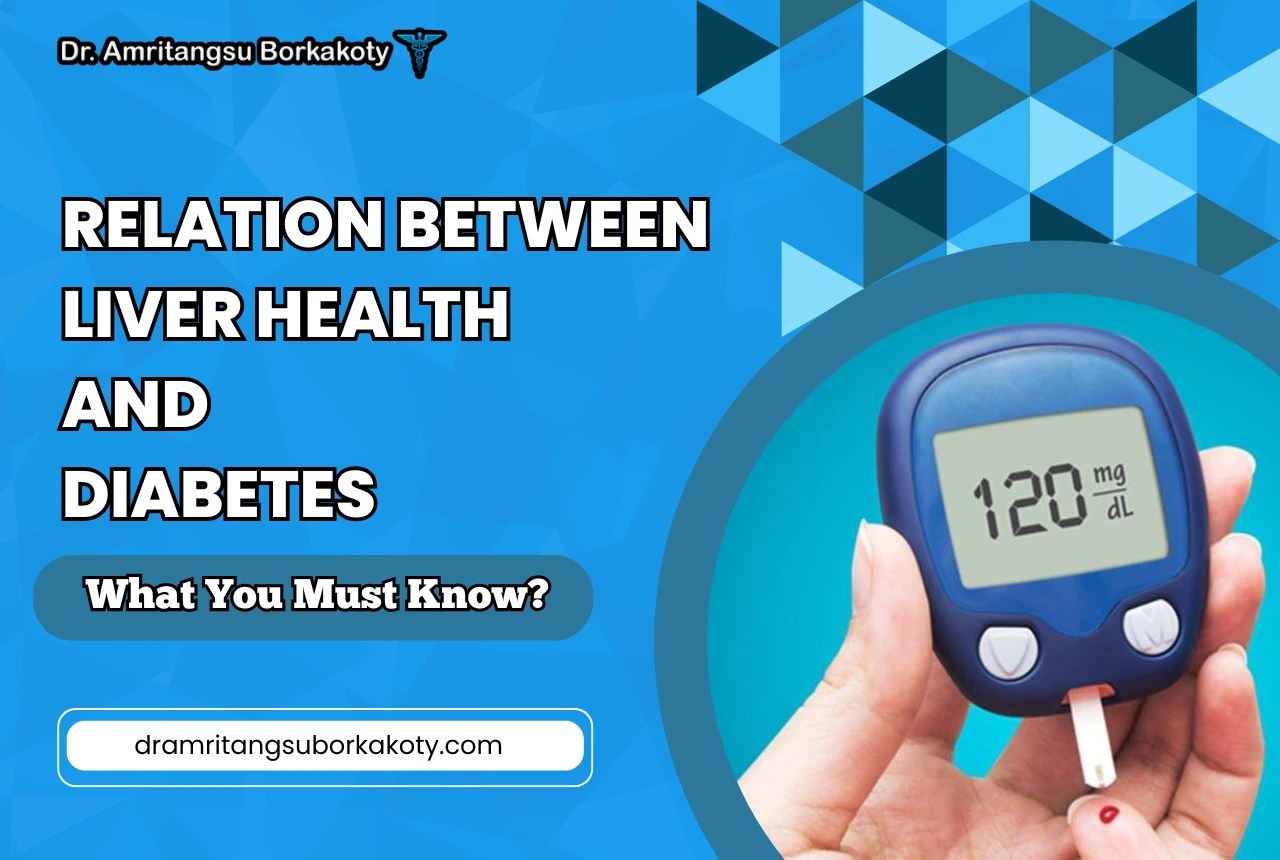
-
 Posted By Dr. Amritangsu Borkakoty
Posted By Dr. Amritangsu Borkakoty -
-
Comments 0
Did you know the relation between liver health and diabetes are more closely related than you may have even considered?
After all, the liver – or the body’s powerhouse, as some have termed it, plays such an important role in detoxification processes, eliminating harmful substances from the body, ensuring the regulation of metabolic processes, and storage of nutrients vital to maintaining the body in smooth-working condition. However diabetes is a rising epidemic, and it’s added a whole new level of stress to the liver that can make complications as serious as fatty liver disease occur.
Where millions are affected by diabetes, it is essential to understand the intricate relationship between them. How does one impact the other? What can you do to protect both your liver and your general well-being? Let’s dive into this fascinating relation between liver health and diabetes so that you may better take control of your health journey.
The Relation Between Liver Health and Diabetes

The relation between liver health and diabetes is really fascinating, diabetes has profound effects on liver function, primarily mediated by mechanisms involving insulin resistance and increased glucose production in the liver. The liver of a patient with type 2 diabetes might be overproducing glucose, thereby maintaining hyperglycemia. One of the most common expressions of this interrelationship is NAFLD, now also referred to as MASLD.
According to studies, around 70% of patients with type 2 diabetes suffer from MASLD, so this affirms the condition’s prevalence among diabetic patients. Characterized by an accumulation of fat in the liver, this condition may go on to more severe forms, such as NASH, fibrosis, cirrhosis, and hepatocellular carcinoma.
The major link driving the relationship between diabetes and liver disease is insulin resistance. In the early stages, diabetes makes a less responsive liver to insulin due to poor glucose metabolism and increased deposits in hepatic tissues by fat. This can produce a vicious cycle of worsening insulin resistance over time, thereby complicating the management of the disease.
Impact of Diabetes on Liver Disease Progression

When you misunderstand the relation between liver health and diabetes, you might overlook the possible damages that might impact your body. Poorly controlled diabetes speeds up liver damage significantly. Obesity and metabolic syndrome play a major role in the transition from simple fatty liver to more advanced conditions like cirrhosis or even liver cancer.
For instance, patients diagnosed with diabetes in addition to NAFLD have a greater chance of developing severe complications because both diseases have common mechanisms affecting their pathophysiology. Diabetic patients with NAFLD are more likely to have advanced fibrosis as compared with non-diabetic patients.
This relation between liver health and diabetes is further complicated by the presence of metabolic syndrome, which contains obesity, hypertension, and dyslipidemia. The synergistic nature of these conditions can have a more rapid effect on the decline of liver health and increase mortality risk due to complications from the disease.
Diagnosis and Management of Liver Disease in Diabetic Patients

The imaging tests include ultrasonography or Fibroscan, which measures the liver stiffness and fat content in diabetic patients. Blood tests that measure the levels of liver enzymes in the blood can also provide evidence of damage or inflammation.
Fortunately, with proper management of liver health and diabetes, lifestyle changes, and medical interventions, the individual’s glycemic control can be maintained. Some tactics in this list would include diet, exercise, and medication which would be tailored for a person with concurrent liver disorders. Some of the treatments may have the effect of protecting the liver, while others can ultimately cause liver problems; therefore, care should be taken in selecting the remedy given.
Diet plans need to be altered in order to assist with these two conditions simultaneously. It would involve the intake of more whole foods such as fruits, vegetables, lean proteins, and healthy fats, all in order to help stabilize blood sugar levels while keeping the liver in good health.
Expert Insights: Dr. Amritangsu Borkakoty’s Perspective
The number one liver specialist with his operative complex at Guwahati in Assam is Dr. Amritangsu Borkakoty, who presents himself with such professionalistic approaches for best practices in hepatology, care, and disease management. Dedication to medical treatment of the sick puts him strictly as a leading figure in managing liver health, particularly in its association with diabetes.
Dr. Borkakoty underlines the importance of the relationship between his clinical practice with patients and the association of liver health with the management of diabetes mellitus. He opines that NAFLD plays a critical role in influencing insulin resistance, which inherently complicates the management of diabetes. He believes that regular check-ups for monitoring liver function, especially in diabetic patients, will be worthwhile since early indication of liver disease will ultimately result in better management of such diseases.
Besides, Dr. Borkakoty emphasizes diet regulations: a balanced diet rich in whole foods, combined with a reduction in sugar and unhealthy fats. On top of that, he suggests doing exercise regularly that would increase the sensitivity of one towards insulin and will aid in the overall well-being of the person. With these lifestyle changes along with regular follow-up at the clinics, diabetic patients can comfortably keep their blood sugar under control and protect their livers.
Conclusion
Maintaining a healthy relation between liver health and diabetes is very essential to the broad management of health. It is this connection that sets one in a position to take care of both conditions by making informed lifestyle choices and by accessing medical advice appropriately.
Proper screening and assessment by the health care providers help monitor the problems at early stages for proper management. Thus, regular care for the liver condition with the management of diabetes can offer better outcomes and a quality life.
Recent Posts
- Common Causes of Stomach Ulcers and Effective Treatment Options
- Early Symptoms of Liver Damage: How to Spot the First Warning Signs Before It’s Too Late
- Best Treatment for Hepatitis B and C: Your Complete Guide to Symptoms, Care, and Prevention
- How to Reduce Liver Inflammation Fast: 5 Proven Tips for Rapid Liver Recovery
- Why You Shouldn’t Ignore NAFLD: 5 Shocking Health Risks You Need to Know



